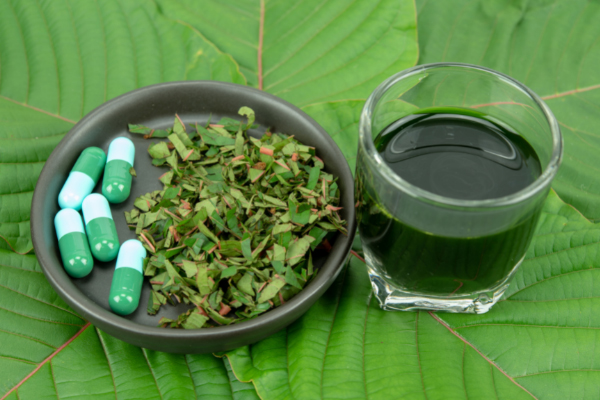Kratom is a plant native to Southeast Asia that belongs to the Mitragyna species. It is a tropical evergreen tree from the coffee family and is indigenous (naturally occurring) to Thailand, Indonesia, Malaysia, Myanmar, and Papua New Guinea. It has been used in herbal medicine since the 19th century, but it is now being used recreationally due to its psychotropic and mind-altering effects.
Kratom and Opioid Withdrawal
Kratom can produce effects similar to opioids and stimulants, so it has recently been promoted as an aid to help people self-manage opioid addiction. There are two compounds in kratom leaves, mitragynine and 7-α-hydroxymitragynine. These compounds interact with opioids and other receptors in the brain, producing stimulant-like effects and sedation, pleasure, and decreased pain. When kratom is taken in small amounts it increases energy, alertness, and sociability. It has sedating effects, increases pleasure, and decreases pain in large amounts.
Kratom As a Potential Treatment For Opioid Addiction?
Kratom can help relieve symptoms of opioid withdrawal, so it has been studied as a potential treatment for opioid addiction. However, it can also cause uncomfortable and dangerous side effects like psychosis.The National Institute of Health Innovations in Clinical Neuroscience “Kratom and the opioid crisis” states:
The FDA has noted that, because of its action at opiate receptors, which leads to euphoric and analgesic effects, kratom is being increasingly sought out for chronic pain relief and also as a treatment for opiate addiction. Kratom is also being sought to relieve anxiety and mood issues. The FDA cautions that, at present, there is no reliable evidence for the use of kratom in opiate use disorders. There is also concern that the products being sold as kratom are being laced with other compounds that reportedly have led to an array of adverse effects, including withdrawal symptoms, seizures, psychosis, and liver damage. It has to be noted that the concentration of kratom’s psychoactive compounds is variable with the geographical area and time of harvest, which can lead to different and unreliable results. (NIH)
Is Kratom Addictive?
Another issue with kratom is that it in itself can potentially lead to dependence and addiction, as evidence suggests. Studies have been done on this, and individuals that took kratom for more than six months experienced withdrawals from it. The withdrawal symptoms that kratom produces are similar to those of opioid withdrawal. Some of the withdrawal symptoms that kratom can produce include:
- insomnia
- muscle aches
- runny nose
- irritability
- hostility
- aggression
- emotional changes
- jerky movements
There are no specific treatments for kratom addiction but specific treatments for opioid addiction. Trying to self-manage opioid addiction is just like self-medicating. Instead of getting treatment from a medical professional, the person is trying to take things into their own hands. There is so much more to treating an opioid addiction besides just treating the withdrawal symptoms. The behavior and reason why the person got addicted to opioids in the first place ultimately have to be treated, or relapse will occur.
Start Treatment for Opioid Addiction at Evoke Wellness Coconut Creek
Evoke Wellness Coconut Creek is a premier treatment facility committed to providing the best care for anyone battling drug and alcohol addiction. Our top priority is your safety and comfort, and life in sobriety is our primary mission. Our team of professionals is some of the most experienced, compassionate, non-judgmental, and understanding people in the addiction field. We will treat you with the kindness and respect you deserve and help you start healing and moving forward on your path to long-term recovery. Help is only one phone call away. So give us a call today.



